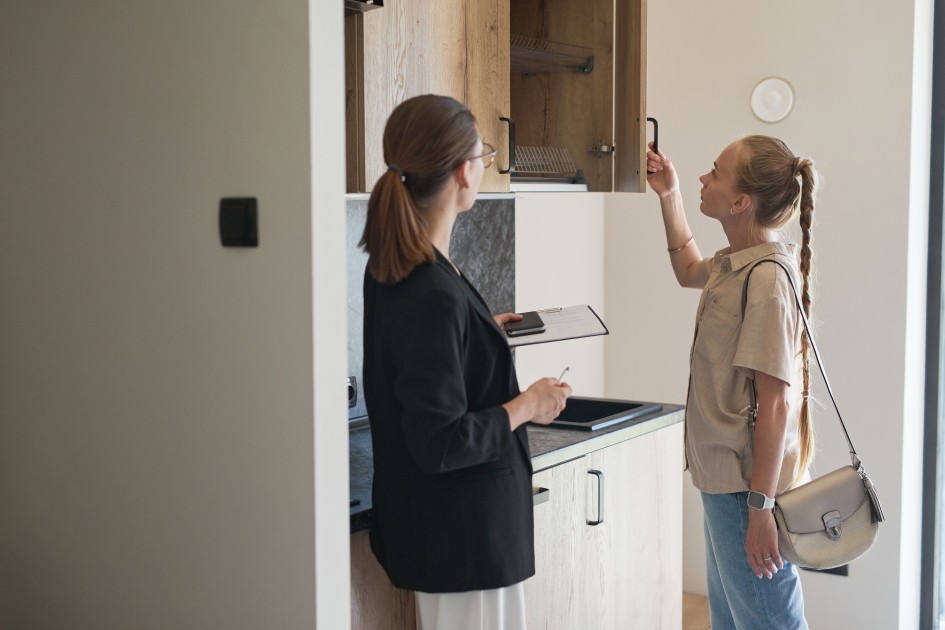
Buying your first home can be a dream come true, but it can also be complicated. Between finding the right mortgage and deciding what you want in a home, there’s a lot to consider. Thankfully, with the right guidance, the process can become manageable and even enjoyable. If you’re new to the homebuying journey, you’re in the right place.
Whether you’re buying your first home in Miami, FL or Monterey, CA, these first-time homebuyer tips will give you the wisdom to navigate the homebuying process with ease. Let’s get started.

In this article:
- Planning and preparing financially
- Finding the right mortgage
- House hunting
- Making the deal
- What comes next?
Planning and preparing financially
1. Take a homeownership course
Homeownership courses can help clarify each part of the homebuying process. They cover topics like budgeting, building credit, mortgage options, house hunting, and closing.
If you’re unsure where to start, check with HUD-approved counseling agencies, non-profit organizations, and local housing authorities to find available courses. Along with the expertise you’ll receive, some programs or lenders may offer incentives for completing courses such as lower interest rates and down payment assistance.
2. Look into first-time homebuyer benefits
Many programs are designed to make homeownership more accessible for first-time buyers by reducing upfront costs, lowering monthly payments, and helping with mortgage qualification.
- State and local programs: Cities and states may offer down payment assistance, forgivable loans, or closing cost help. Check with your state’s housing finance agency for options.
- Federal loan options: Government-backed loans like FHA, VA, and USDA loans are popular among first-time buyers, offering flexible credit and down payment requirements.
- Fannie Mae’s HomePath Ready Buyer
 Program: This offers up to 3% in closing cost assistance when purchasing a HomePath property and completing a homeownership course.
Program: This offers up to 3% in closing cost assistance when purchasing a HomePath property and completing a homeownership course. - Good Neighbor Next Door: Offered by HUD, teachers, law enforcement, firefighters, and EMTs may receive a 50% discount on eligible homes in revitalization areas.
- Mortgage Credit Certificates (MCC): Some state programs offer MCCs, which provide a federal tax credit for a portion of annual mortgage interest.
While these programs can be incredibly helpful, many have eligibility rules based on income, location, or occupation. It’s best to start your research early and gather the required forms and documentation ahead of time.
>>Read: First-Time Home Buyer Benefits and How to Qualify
3. Improve your credit score
A higher credit score leads to better mortgage interest rates, saving you thousands over time. To improve your credit score:
- Check your credit report: Review for errors and dispute any inaccuracies quickly.
- Pay bills on time: On-time payments have the biggest impact on your credit score, proving you’re reliable and consistent with debt.
- Pay down debts: Lower balances can improve your credit utilization ratio.
- Avoid new credit: Don’t open new credit accounts or make large purchases before applying for a mortgage.
- Keep old accounts open: Maintaining long-standing accounts improves your credit history.
>> Discover: How to Improve Your Credit Score Before Buying a Home
4. Save up for a down payment
It’s important to start saving early for a down payment, ideally 20%. With 20% down, you can have lower monthly mortgage payments, qualify for a lower interest rate, and avoid private mortgage insurance (PMI). If a high down payment isn’t realistic, it’s worth checking state and local first-time homebuying programs for down payment assistance.
Best practices for saving include budgeting, opening a separate savings account with automatic monthly payments, reducing major expenses, and monitoring your spending to determine where you need to cut back.
5. Save for closing costs
Closing costs are fees and expenses you’ll pay when finalizing the home purchase. These typically range between 2-5% of the home’s purchase price. On a home purchased for $350,000, closing costs could run anywhere from $7,000 to $17,500. With such a significant difference, it’s best to prepare for the higher end of the range.
If you’re looking to save, consider asking the seller for concessions, exploring lender credits, or looking into assistance programs that cover closing costs.
Common closing cost fees include:
- Application fee: Up to $500
- Appraisal fees: $300-$500
- Title insurance: 0.5% to 1% of the loan amount
- Escrow fees: 1% of the home sale price
- Recording fees: $125
- Property taxes: Varies
- Homeowner’s insurance premiums: Varies
6. Build an emergency fund
An emergency fund is a cash reserve designated for emergencies and other uncommon expenses. The goal is to put money aside in preparation for things like job changes, medical bills, and home repairs. As a golden rule, aim to save up 3-6 months of your current living expenses for your emergency fund.
“Make sure you’re on track with your other financial goals before your first home purchase: pay off any high interest rate debt, clean up your credit, prioritize saving for retirement, and make sure to build up at least 3 months of emergency savings. A solid financial foundation is key before taking on a mortgage payment.” – Sophia Bera, finance blogger, Gen Y Planning
7. Determine how much house you can realistically afford
Before you start browsing listings, it’s important to understand what fits comfortably within your budget. A home affordability calculator can help you estimate your price range based on your income, debts, down payment, and projected expenses.
You don’t need to have everything fully figured out, but start with an amount that feels realistic for your savings goals. From there, you can adjust as needed while weighing monthly mortgage payments, taxes, insurance, and other homeownership costs.
8. Factor in home maintenance costs
Every home has one thing in common: they require ongoing maintenance. When preparing your finances, be sure to budget for regular upkeep and repairs. A good rule of thumb is to set aside 1% to 4% of your home’s value in a maintenance fund. This will help you keep your home in good shape, prioritizing routine maintenance and home repairs as they occur.
“When I bought my first house, the only thing I was worried about was whether I could afford the mortgage payment. After I needed to repair my HVAC unit, replace my roof and furnish my entire home, I quickly realized that the mortgage is only one piece of the homeownership puzzle.” – Andy Hill, finance podcaster, Marriage, Kids, and Money
Finding the right mortgage
9. Shop around to compare lenders and loan terms
Comparing mortgage lenders and terms can save you thousands of dollars over the life of your loan, so don’t settle for the first offer. It’s generally recommended to apply to several lenders before deciding.
Loan types for first-time homebuyers include:
- Conventional Loan: Offers flexible down payment options as low as 3% with private mortgage insurance (PMI). These require a higher credit score and must fall within conforming loan limits.
- FHA Loan: Designed for buyers with lower credit scores. These require just 3.5% down, but includes mortgage insurance for the life of the loan.
- VA Loan: Available to eligible veterans, active-duty service members, and family members. No down payment or mortgage insurance is needed, often with lower interest rates.
- USDA Loan: Ideal for buyers purchasing in eligible rural or suburban areas. No down payment is required, but income limits apply based on location and household size.
- Adjustable-Rate Mortgage (ARM): Starts with a lower fixed rate, then adjusts based on market trends. ARMs can help you save early on, but carry the risk of rate increases.
- Fixed-Rate Mortgage: Offers predictable monthly payments and a stable interest rate for the loan’s duration. This is ideal for buyers who plan to stay in their home long-term.
When choosing a mortgage, consider your credit score, down payment savings, income stability, and location to find the best fit for your financial needs.
>>Discover: 6 Types of Home Loans for First-Time Buyers
11. Get preapproved before you start house hunting
Before finding your dream home, take the important step of getting preapproved for a mortgage. Preapproval will signal you’re a serious buyer and help you understand how much you can borrow.
Many people mistake preapproval with prequalification, but they’re not the same.
- Prequalification: An estimate of how much you might be able to borrow based on the financial information you provide.
- Preapproval: A conditional offer from a lender including how much they’re likely to lend you based on your credit, income, and finances. This holds more weight than prequalification and gives a realistic homebuying budget.
What you’ll need to provide for mortgage preapproval:
- Proof of income
- Employment verification
- Recent pay stubs
- W-2 forms
- Photo ID
- Social security number
- Credit history
- Debt-to-income ratio (DTI)
>>Read: How to Get Pre-Approved for a Mortgage

House hunting for success
12. Make a priority checklist
Before house hunting, it’s time to evaluate your preferences with a priority checklist. You’ll want to separate must-haves from nice-to-haves. For example, the number of bedrooms and location of the home might be essentials, while quartz countertops might simply be a nice addition.
When crafting your list, think long-term. Consider how your needs might change in 5 to 10 years. Will you need more space? Will a large yard feel like too much upkeep?
Also, think about practical details beyond the home itself, such as neighborhood safety, commute times, school district ratings, and parking options. These can greatly affect your daily life and future resale value.
13. Do your homework during the home search
Once you have your list, it’s research time. Be sure to consider the following when searching for homes:
- Neighborhood: Explore the neighborhood in-person to get a feel for the community and daily life. Take note of things like traffic flow, noise levels, and if possible, try to talk to some of the neighbors.
- Local market: It’s a good idea to check the local housing market to get a sense of pricing, competition, and how much room you have to negotiate.
- Future development: Check city planning or zoning websites for upcoming residential and commercial developments. A new park might boost property value, while a highway expansion could impact quality of life.
- School zones: Even if you don’t have children, school ratings are important for resale and property value. Use online tools and local school district sites to compare options.
14. Bring a friend to showings
When evaluating a home, first-time homebuyers might overlook important details. Along with your trusted real estate agent, it’s helpful to bring a friend or family member. An extra set of eyes can spot potential issues and ask thoughtful questions during the tour.
Just be mindful of who’s tagging along. Someone who can focus on structural and design aspects of the home instead of staging is preferred. If they have experience in construction or home improvement, even better.
15. Work with a trusted real estate agent
An experienced real estate agent can guide you through the buying process, offering expert advice and negotiating on your behalf. It’s best to connect with at least a few agents before selecting one. Like other professionals, agents have unique skills and personalities, so it’s worth finding one who’s compatible with you.
Select an agent who:
- Has a compatible schedule to meet for showings, reviewing contracts, and discussions.
- Has a similar communication style that suits your preferences.
- Feels comfortable and trustworthy, so you feel supported during the homebuying process.
- Has local market knowledge of current trends, property value, and neighborhoods.
15. Think about resale value and the potential to build equity
Your first home is a step toward long-term financial growth. As you look at properties, think about how easily it could sell later on. Consider factors like home condition, market trends, location, school quality, and the environment.
Also keep an eye on equity potential. As your home appreciates and you pay down your mortgage, you build equity, which is the portion of the home you truly own. Over time, this equity can help you upgrade to your next home, fund renovations, or bring more financial flexibility when life changes.
>>Read: How to Build Equity in Your Home
16. Stay within your budget
Sticking to your budget is key to long-term financial success. It’s important to note that a lender might offer you a higher loan amount than you can comfortably afford, but that doesn’t mean you should spend it all.
Don’t forget to consider the hidden costs of homeownership such as property taxes, utilities, and maintenance. Staying comfortably within your budget will set you up for success now and in the future.
Making the deal
17. Make an offer you feel comfortable with
When you’re ready to make an offer, pay attention to more than just the list price. Recent sales, market trends, and the home’s condition should all contribute to your offer. Lean on your real estate agent to help you make an informed decision.
Include key contingencies like a home inspection, appraisal, and financing. These protect your interests and give you an out if something unexpected pops up. In a competitive market, some buyers waive contingencies to stand out, but it’s a risk worth weighing carefully.
You’ll also submit earnest money, a small deposit showing you’re serious. It’s typically applied to your down payment or closing costs if the deal moves forward.
18. Negotiate with the seller
Once your offer is submitted, don’t be afraid to negotiate. You might be able to save money by finding a deal that benefits both parties. Your agent can help you understand where you have room to negotiate. These are the areas to focus on:
- Price: If the home is overpriced, your real estate agent can help you with a counter offer based on comparable sales.
- Repairs: Use your home inspection report to negotiate. You can request that the seller makes repairs before closing or ask for a credit so you can handle them after moving in.
- Closing costs: It’s common to ask the seller to cover some of the closing costs. This can ease upfront costs, but some lenders put a cap on how much a seller can contribute.
- Timeline: Flexibility can work in your favor. You might offer to adjust the closing date to meet the seller’s needs in exchange for other concessions.
>>Read: Negotiating After the Home Inspection: 8 Tips to Get the Best Deal
19. Hire a home inspector and appraiser
A home inspection and appraisal are essential steps before finalizing your purchase. A licensed home inspector will evaluate the property’s condition, checking for issues like structural damage, plumbing concerns, or roofing problems.
An appraiser, on the other hand, will assess the home’s market value. This protects you and your lender from overpaying. Together, these steps help ensure you’re making a smart investment and give you a chance to renegotiate or back out if major issues arise.
20. Get homeowner’s insurance
Before closing, you’ll need to secure homeowner’s insurance. It’s typically required by your lender. This coverage protects against common risks like fire, theft, and personal liability.
Be sure to shop around for quotes to find the best coverage at the right price. Depending on your location, you may also need separate flood or earthquake insurance, as these aren’t included in standard policies.
21. Save physical copies of everything
Once you close, stay organized by keeping all your key documents in one place. A dedicated folder or a secure digital system should do the job.
This paperwork is essential for tax purposes, future refinancing, or if you decide to sell. Keep copies of your purchase agreement, loan documents, appraisal, inspection report, title insurance policy, and closing disclosure. Having everything on hand will save time and stress down the road.
First-time homebuyer tips: What comes next?
Your journey doesn’t end at closing. Stay ahead by keeping up with home maintenance, saving for unexpected repairs, and building a go-to list of local pros. Now that you have all the first-time homebuyer tips, you feel confident and prepared for life as a new homeowner. It’s time to settle in and celebrate.
The post 21 Essential Tips for First-Time Homebuyers appeared first on Redfin | Real Estate Tips for Home Buying, Selling & More.